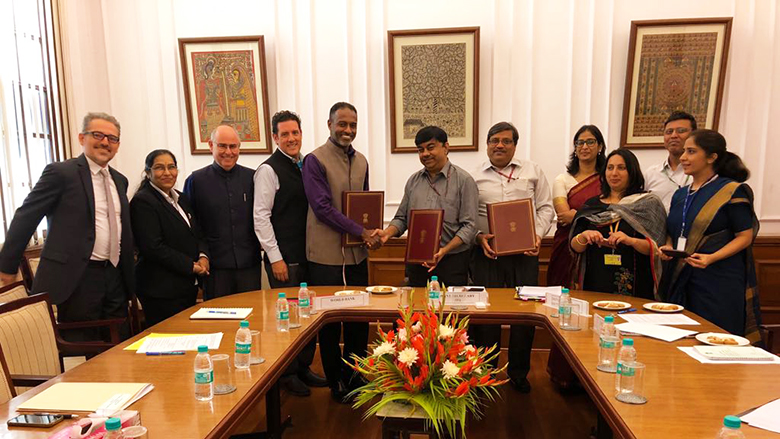New Delhi, April 24, 2018 – The Government of India and the World Bank today signed a $125 million agreement to support India in developing an innovative biopharmaceutical and medical devices industry, which is globally competitive and addresses the country’s major concerns around barriers to affordable healthcare.
The Innovate in India for Inclusiveness Project (I3) will support Government of India’s Biotechnology Industry Research Assistance Program (BIRAC), set up five years ago to support innovative start-ups and collaborations through strategic partnerships.
This project, will nurture next generation technical skills; provide companies with advanced shared facilities to conduct clinical validation; link clinical trial sites with networks of expert advisors and international bodies; and strengthen all institutions involved in the facilitation and adoption of global innovations, technologies, and licensing models.
The agreement for the Project was signed by Sameer Kumar Khare, Joint Secretary, Department of Economic Affairs, Ministry of Finance, on behalf of the Government of India; Mohd. Aslam, Managing Director, Biotechnology Industry Research Assistance Council (BIRAC); and Hisham Abdo, Acting Country Director, World Bank India, on behalf of the World Bank
BIRAC will now scale-up its efforts across the industry and focus on providing the ingredients that are currently missing in India’s biopharma innovation ecosystem. It will facilitate a more collaborative research and development environment (R&D), leverage the expertise of local and international players from both the public and private sectors, and make India more competitive. It will also help create an ecosystem that facilitates development of a continuous pipeline of products in the health sector. This will help India emerge as a low-cost healthcare provider for the world.
“India is emerging as a global player in many areas. This is certainly the case in the areas of bio-generic medicines, vaccinations and medical devices. Indeed, India is in a position to deliver safe, effective and low-cost vaccines to tackle the host of diseases that plague billions around the world,” said Hisham Abdo, Acting Country Director, World Bank India. “The proposed project is designed to leverage India’s potential and capability to achieve this global goal,’ he added.
The project will also promote industry-academia interface and enable start-ups and small and medium enterprises to build innovation research capacities for developing affordable healthcare products.
“BIRAC has been playing a critical role in developing and sustaining the innovation ecosystem in India. This landmark collaboration between the Department of Biotechnology and World Bank will further catalyze this ecosystem to develop new vaccines, diagnostics and core R&D technologies of medical technology devices while strengthening the existing infrastructure and building collaborative partnerships in parallel,” said Renu Swarup, Secretary, Department of Biotechnology, Ministry of Science and Technology.
The $125 million loan from the International Bank for Reconstruction and Development (IBRD), has a 5-year grace period, and a maturity of 19 years.

